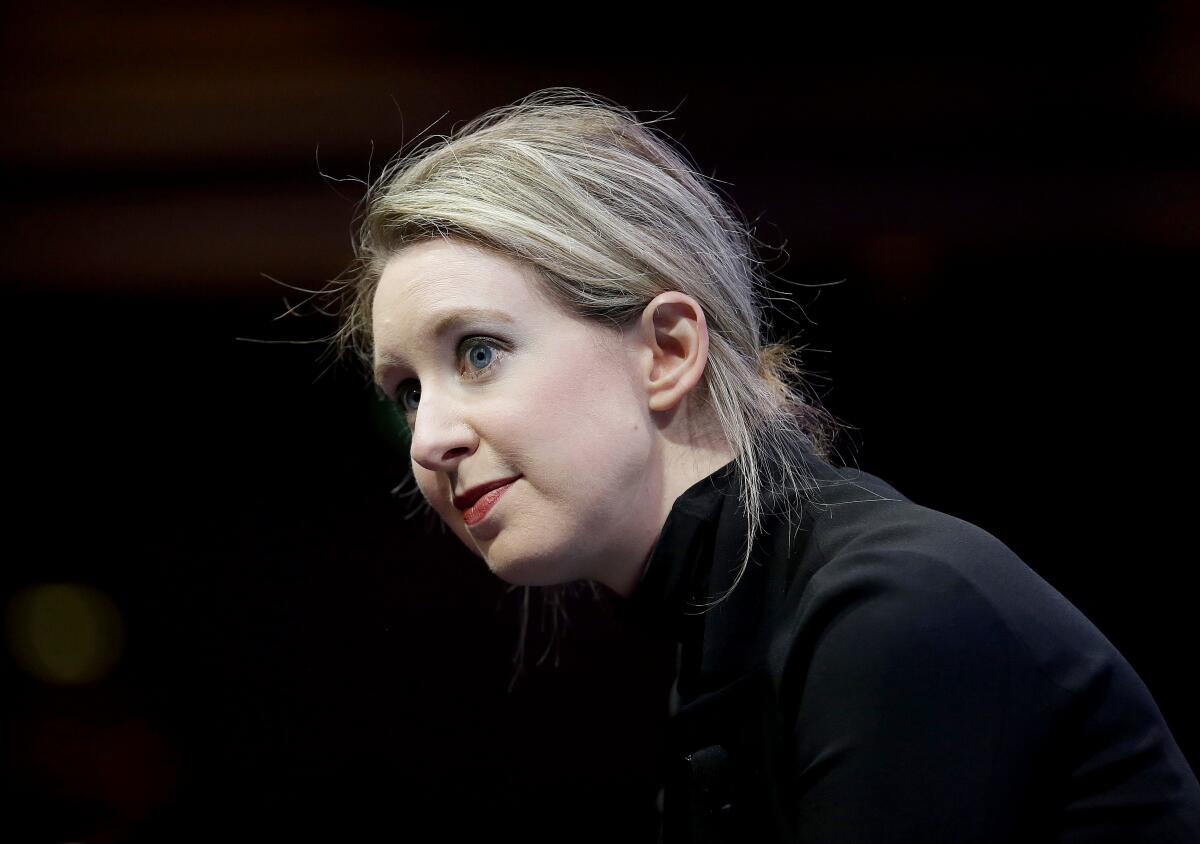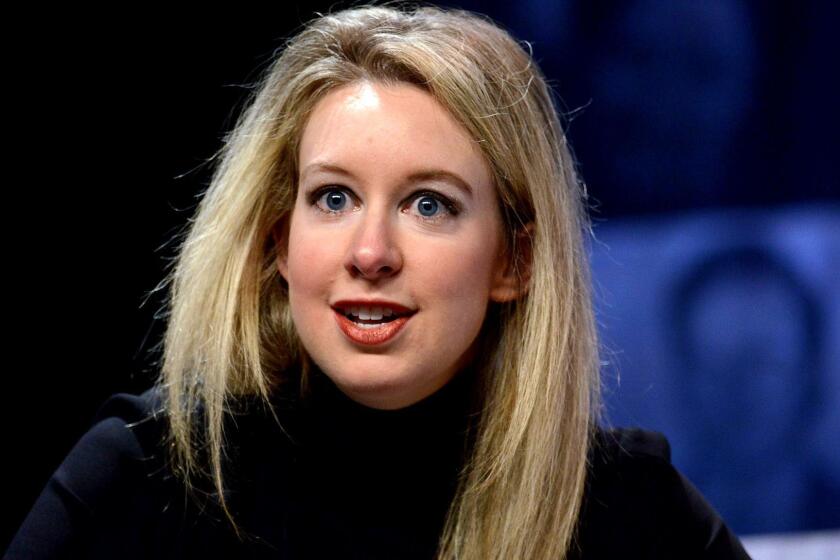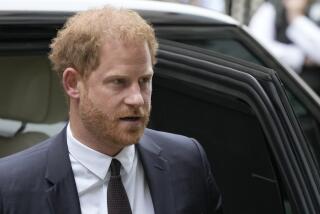Theranos reporter ready to take stand if called in Holmes trial

- Share via
The investigative journalist whose story sparked the downfall of Theranos Inc. said he’d yet to receive a subpoena in the trial of company founder Elizabeth Holmes though he was willing to offer his testimony.
John Carreyrou, whose October 2015 report in the Wall Street Journal cast doubts about the efficacy of Theranos’ technology, locked horns with the company’s outside lawyers at Boies Schiller Flexner. Heather King, a former Theranos general counsel who subsequently returned to Boies Schiller, sent the Journal retraction demands, he said.
“There was an incredibly aggressive, scorched-earth legal campaign, as I called it in my book, to threaten and intimidate me to get this story killed,” said Carreyrou, a two-time Pulitzer Prize winner. “I would be a very good witness for the prosecution and a terrible one for the defense.”
By the time his book on Theranos was published in May 2018, the company was imploding. Carreyrou is now one of dozens of potential witnesses, including former Secretary of State Henry A. Kissinger and famed litigator David Boies, who could take the stand in Holmes’ criminal fraud trial, set to start Tuesday in federal court in San Jose.
Boies, who recently declined to discuss with Bloomberg Law whether he might testify in the trial, has said he acted ethically in advising Holmes.
“One thing I’ll say in David Boies’ defense — I can’t say that he knew what was going on at Theranos and in its lab,” Carreyrou said. “I get the sense he did not know, at least until after I started asking questions.”
The owner of Dow Jones & Co. and the Journal, media magnate Rupert Murdoch, could also be called as a witness. Murdoch, who sold his $125-million stake in Theranos for $1 in 2017, stood by the Journal’s editors and Carreyrou’s reporting.
Carreyrou said companies he worked with on the Theranos story had been so vigorous in defending him he never needed to hire his own lawyers.
Four years ago, the Silicon Valley firm Theranos Inc. was valued at $9 billion and its founder and Chief Executive Elizabeth Holmes was hailed as a potentially revolutionary force in the blood-testing industry.
Instead, it was in-house counsel — at the Wall Street Journal, Penguin Random House-owned publisher Alfred A. Knopf Inc., and now Sony Music Entertainment, which tapped him to host a podcast — that protected Carreyrou as he worked to unravel the sudden rise and fall of Theranos.
“When I was at the Journal, I relied on the Journal’s legal team,” said Carreyrou, who singled out general counsel Jason Conti and associate general counsel Jacob Goldstein. “I have a lot of respect for them, and they vetted the hell out of my reporting.”
Conti, who in 2015 was a deputy general counsel and chief compliance officer for Journal parent Dow Jones, didn’t respond to a request for comment. Goldstein, who was an assistant general counsel at Dow Jones when Carreyrou began his Theranos reporting, declined to comment.
Carreyrou’s reporting led to his book, “Bad Blood: Secrets and Lies in a Silicon Valley Startup,” which was the basis for an Alex Gibney-directed documentary in 2019. The book has also been adapted for a future film starring Jennifer Lawrence.
When Carreyrou went to write “Bad Blood,” Knopf told him the company had a $10-million insurance policy against libel claims. If anyone, such as Holmes or former Theranos President and Chief Operating Officer Ramesh “Sunny” Balwani, sought to sue over the book, Carreyrou would be liable for legal costs capped at $75,000, he said.
Three weeks after “Bad Blood” was published, Holmes and Balwani were charged with fraud. “It became very hard for her to go after me legally with a defamation claim once she was indicted,” Carreyrou said of Holmes.
Holmes and her legal team, after initially accusing Carreyrou of advocacy journalism in bringing about Theranos’ collapse, have failed to float that argument in nearly 18 months, he said. Recently, Holmes’ Williams & Connolly lawyers have turned their focus on Balwani for their defense.
The podcast that Carreyrou is working on with Sony, “Bad Blood: The Final Chapter,” debuted last week on Apple Podcasts. It has been vetted by in-house lawyers and outside counsel contracted by Sony, he said.
In some federal trials, judges have ruled that witnesses can’t attend the rest of the proceedings. But Carreyrou said he must be allowed to attend Holmes’ entire trial to do his duties as a journalist.
“The one thing I am a little bit worried about, if I am called to testify, is what impact that’s going to have on my podcast,” he said.
Carreyrou isn’t the only member of the news media who might testify in Holmes’ criminal case.
Allegedly false statements made by Theranos’ former leader to Roger Parloff for his 2014 profile of Holmes in Fortune magazine could also emerge at trial.
Parloff, a Yale Law School graduate and veteran legal and financial journalist, detailed in a separate 2015 story how he believed Holmes misled him. Parloff declined to comment.







